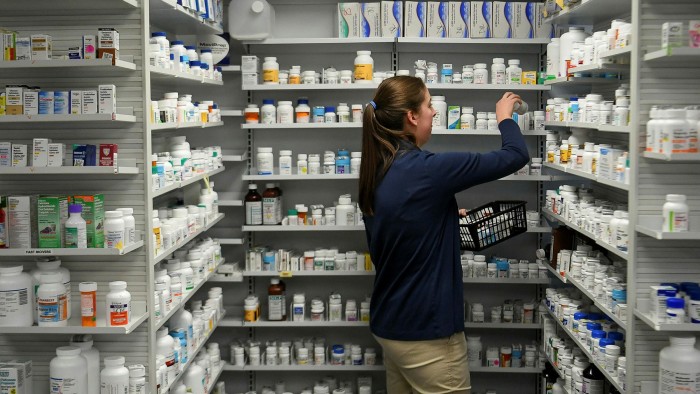Pharma investors should brace for pricing and antitrust action

Roula Khalaf, Editor of the FT, selects her favourite stories in this weekly newsletter.
The writer is head of global healthcare research at Citi
Even with a US Democratic administration that holds control of both the House of Representatives and the Senate, the majority of healthcare investors seem largely unconcerned over the risk to drug pricing.
This may be because the prospect of approval of bills such as HR3, which would give the US government the ability to directly negotiate drug pricing, looks close to zero given how the slim the Democratic majority in the Senate actually is.
However, learnings from my secondary school physics classes suggest that the risk to pharma’s long-term operating model and investor returns is materially greater than meets the eye.
“Pressure follows the path of least resistance,” boomed my rather excellent teacher back in the late 1980s. And the longstanding legislative inability to lower out-of-pocket costs for patients has resulted in overwhelming political pressure.
This is starting to manifest itself in action. The Biden administration recently supported waiving intellectual property rights on Covid-19 vaccines, triggering uproar among drug manufacturers fearful of a slippery slope that would lead to a shake-up of the industry
But the true risk to pharma in response to unacceptable drug pricing may come from elsewhere — namely, growing bipartisan support to increase industry antitrust scrutiny and penalties.
Even under the Trump administration, there were signs that the US Federal Trade Commission was taking a more aggressive antitrust approach. US drugmaker AbbVie’s $63bn deal to buy Allergan, the Irish-domiciled maker of Botox, required a second request for information from the FTC and received a narrow 3-2 vote for approval by commissioners last month.
Bristol-Myers Squibb struck one of the largest pharmaceutical deals in history when it agreed to buy biotech company Celgene in 2019 for $90bn. However, it was required to divest a treatment for psoriasis for $13.4bn.
Such intensifying antitrust scrutiny is global too. The acting chair of the FTC announced in March a working group with the EU, UK and Canadian antitrust agencies to seek to improve antitrust analysis for the industry given the correlation between historic industry consolidation and rising drug prices.
Eight US antitrust bills targeting the pharmaceutical industry have been recently introduced, addressing a gamut of alleged anti-competitive activity. These cover areas such paying for the delay of launches of generic products and “product hopping”, where companies make minor changes to extend the exclusivity of drugs.
Among the Senate moves for greater FTC enforcement, the most pressing concern for the industry comes from those covered in Senator Amy Klobuchar’s proposed Competition and Antitrust Law Enforcement Reform Act. If enacted, the bill would mean many proposed biopharma deals would be presumed to be anti-competitive, with an obligation on the sponsors to disprove. The bill would also lower the bar in demonstrating how a given acquisition would be deemed anti-competitive.
Given ongoing waves of patent expirations, these proposals could not have a come at a worse time for the industry. Between now and the end of the decade, a record breaking amount of more than $150bn of US major pharma revenues will be exposed to generic or biosimilar competition.
Under an extreme scenario without recourse to future M&A, many pharma companies would face prolonged periods of earnings decline, potential dividend cuts and arguably derating.
The political road ahead on antitrust reform is not yet certain. The Democrats will need to convince at least 10 Republican senators to vote with them for the Klobuchar bill to pass. They will have to hope that recent ire towards tech companies will have liberated some Republicans from their free market leanings on antitrust issues.
But this is not the only reason why some Republicans may support antitrust reform in pharma. Drug pricing remains a top three issue among the electorate ahead of the 2022 House and Senate elections, while industry consolidation arguably has led to greater unemployment.
The temptation for pharma to maintain the status quo that has served the industry well for the past two decades would be a profound mistake. Another law of physics states that “pressure in a closed system is transmitted equally throughout”. For drug pricing, the political pressure has reached an all-time high. The drug pricing door might be closed, but other doors lead to places the industry would best avoid.
Comments